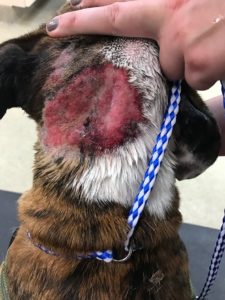Hot spots, also known as acute moist dermatitis or pyotraumatic dermatitis, are a common skin condition in cats and dogs. The condition is characterized by moist, red, and inflamed lesions on the skin. Although not serious, hot spots can be very irritating and painful, so it is important that they are treated as soon as possible.
Causes of Hot Spots
Hot spots occur when a pet repeatedly scratches an area of itchy skin. Scratching damages the surface of the skin which can then become inflamed and infected. Underlying causes of itchiness and scratching include allergies, parasites, infections, and injuries such as cuts or abrasions.
Symptoms of Hot Spots
The most common symptom of hot spots is itchy and inflamed patches of skin. These are usually moist, red, and hot or painful to the touch. You may also notice hair loss, matted hair, discharge, or scabbing at the site of a hot spot.
Pets with hot spots will often chew, lick, and scratch the affected area in an effort to relieve their pain and discomfort. Please schedule an appointment with your veterinarian if your pet displays any of these symptoms.
Diagnosis of Hot Spots
Your veterinarian will ask you a series of questions to determine the onset and severity of your pet’s symptoms. They will then perform a thorough physical examination to check for clinical signs of hot spots. Usually, this will be enough to confirm a diagnosis of the condition, although your veterinarian may choose to perform other tests such as bacterial cultures to rule out other health problems.
Treatment of Hot Spots
The goal of treatment is to eliminate the bacterial infection, relieve your pet’s symptoms, and address the underlying cause of hot spots.
To begin with, your veterinarian will clip the hair around affected areas of skin and thoroughly clean your pet’s wounds. Topical medications will then be applied to hot spots to reduce inflammation, fight infection, and relieve pain. Following this initial stage of treatment, oral antibiotics and medications such as corticosteroids will be prescribed to treat infection and reduce inflammation.
Your veterinarian will advise you on keeping your pet’s wounds clean and protected during the healing process. An Elizabethan collar (also known as an e-collar or cone) is an important part of treatment as it prevents pets from inflicting further damage to their wounds as they heal. Please follow all treatment advice closely to aid your pet’s recovery.
Prevention of Hot Spots
The best way to prevent hot spots is to eliminate triggers which can cause itchiness in pets. Always keep your pet clean and well-groomed to minimize the risk of skin infections. It’s also important to administer preventative medications to protect against parasites such as fleas and ticks.
If your pet suffers from allergies, please ask your veterinarian for advice on eliminating allergens from their environment. Finally, schedule regular checkups with your veterinarian so your pet’s overall health can be continuously monitored.


